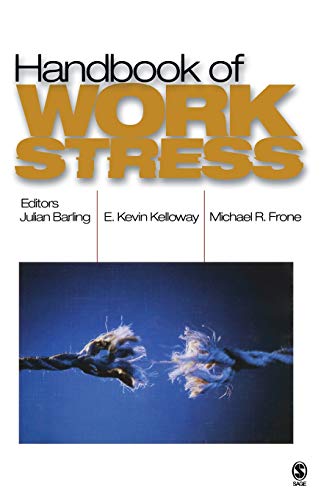Handbook of Work Stress
Julian Barling is Associate Dean and Professor at the Queen's School of Business. He is responsible for rhe Ph.D,M.Sc and Research programs in the School of Business. Dr. Barling is author of of several books, including Employment, Stress and Family Functioning (1990,Wiley & Sons), The Union and Its Members: A Psychological Approach (with Clive Fullagar and Kevin Kelloway, 1992, Oxford University Press), and Changing Employment Relations: Behavioral and Social Perspectives (with Lois Tetrick, 1995, American Psychological Association), andYouth and Employment (with Kevin Kelloway, forthcoming, American Psychological Association). Dr. Barling served as co-editor (with Kevin Kelloway) of the Sage Publication series ,Advanced Topics in Organizational Behavior, is consulting editor of the Journal of Organizational Behavior, and on the editorial boards of the Journal of Occupational Health Psychology, Stress Medicine and the Canadian Journal of Administrative Sciences. From 1989-1991, he was the chairperson of the Advisory Council on Occupational Health and Safety to the Ontario Minister of Labour. In 1995 and 1997, he received the annual awards for "Excellence in Research" from the School of Business, Queen’s University. ... Read more Read less
Questions about the causes or sources of work stress have been the subject of considerable research, as well as public fascination, for several decades. Earlier interest in this issue focused on the question of whether some jobs are simply more inherently stressful than others. Other questions that soon emerged asked whether some individuals were more prone to stress than others. The Handbook of Work Stress focuses primarily on identifying the different sources of work stress across different contexts and individuals. Key Features: • Affords the most broad and credible perspective on the subject of work stress available • The editors are all prominent researchers in the field of work stress, and have been instrumental in defining and developing the field from an organizational-psychological and organizational-behavior perspective • International contributors are included, reflecting similarities and differences from around the world • Chapter authors from the United States, Canada, England, Sweden, Japan, and Australia have been invited to participate, reflecting most of the countries in which active research on work stress is taking place. The Handbook of Work Stress is essential reading for researchers in the fields of industrial and organizational psychology, human resources, health psychology, public health and employee assistance. ... Read more Read less











